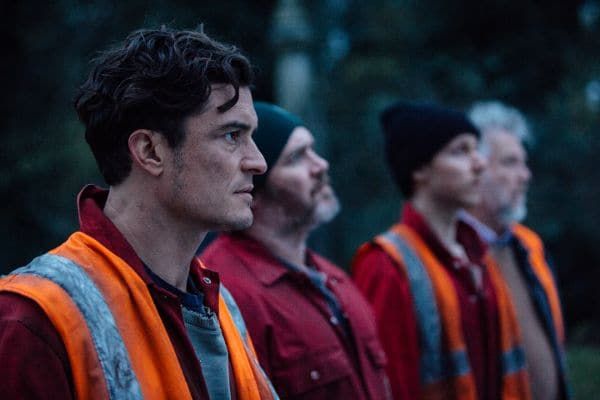Eye For Film >> Movies >> Retaliation (2017) Film Review
Retaliation
Reviewed by: Andrew Robertson

"Shall I take the weight?" is the question, one apposite in a film as big as Romans. Its subject is dark, its protagonist brooding, the talent involved impressive.
Central to it is Orlando Bloom, "Malky", a demolition worker, a man good with his hands, perhaps too ready to use them, a man troubled by something. Something that makes him cross, something that is a rod for his own back, something that he shoulders alone.
Alone despite those around him. He has his intermittent girlfriend, Emma, Janet Montgomery caught in what seems a typical small town trap. He has his colleague and friend, Joe, Alex Ferns, a man who tells the same story about why he is friends with Malky but leaves a detail out. He has his mother, Anne Reid, also seen at Edinburgh's 2017 Film Festival in a similarly complicated maternal position in Kaleidoscope. He also has someone interested in him - a stranger, a priest - an almost unrecognisable Charlie Creed-Miles.
This is a second feature for the Shammasian Brothers, Ludwig and Paul, a follow-up to the stunning Pyramid Texts. It's also a second draft, of sorts - there is another related short, an earlier iteration, but this is something more polished, more rehearsed, possessed of more and greater implications.
Something like Malky's frequent statement - "I'm just tired". It is a refrain, not just in repetition but in what is not being said. Malky is a survivor, and his abuser's identity is connected to the circumstances of the film.
There is a lot going on in Romans, a lot of detail and implicature created by focus and framing and light and shadow. There is a moment where the gothic arch of a half demolished church is lit by flames, a figure hands Malky a hammer, a bag, one heavier than the other, an encounter as symbolic as any crossroads violin duel.
There is a lot of that symbolism, a lot of myth and legend - stories told and re-told until they might be true, whatever is left out. A lot of hands and nails and hammers, a lot of allegory and allusion, even illusion - there is a questioning, at times, as to what is real, what has been written by flesh in word and deed, what is a trick of the light, of the eye, of the mind. Malky is engaged in the act of demolishing a church, but that is not the only part of his past that has returned.
Written by Geoff Thompson, who along with the Shammasian Brothers and no small measure of theme and intent and language makes up the points of commonality that I could find with that earlier short, this is something dense with textual sophistication, with points of reference, with moments that fit as neatly as dovetailed joints, that swing with the power of a hammer. That hammer is an able tool - it can create, it can destroy, it drives nails, it damages fingers - in motion it cannot be trusted. So too Malky.
Orlando Bloom is stunning, a performance of looks and grunts and things unsaid and, gradually, of speaking. In the smallest moments, to listeners other than the audience, to audiences other than the listener, in the act of making a cup of tea or visiting the pub or in stories other people tell he brings a bruised and bloodied and tattooed and sullen intensity, and underneath that armour of scars and ink there are other scars, other marks, something special behind those eyes that are now cold.
The Pyramid Texts too were rooted in a single performance, but this is a different entity, there towering, here cowering, both still driven by fists and fury and grief and gravid equally with portent and symbol, but here not the heiroglyphs of historicity but the word made flesh. Stations absorbed through language unconsciously. The title comes from a piece of text, one brought to the foreground and used as conclusion stunningly, searingly, as Malky's flares of anger become fuel for something more complex, all rooted in words that share a title with the film. One does not have to believe, but Malky, Bloom, please know, can be believed.
There is an earlier version of this film, a short by the Shammasians and Geoff Thompson, but this is a stronger version of at times identical words, a translation to film of a good book, a product of rehearsal. It is clearer, chronologically simpler but emotionally more complex, drawing depth from those around Malky, adding points to the structure around the suffering at its core, details to the torment, arms to the cross, stigmata to the hands.
"Shall I take the weight?", in a place half-deconstructed, "shall I take the weight?" in a moment early in the film. Hefty of theme, laden with symbolism, perhaps at times heavy-handed, it is a solid and moving piece nonetheless. Densely layered, thematically and in terms of visual composition, it is something you should not wait to see. There are thorns, but they protect beauty.
Reviewed on: 01 Jul 2017
















